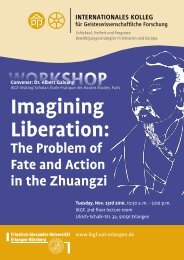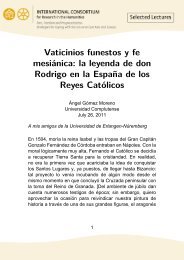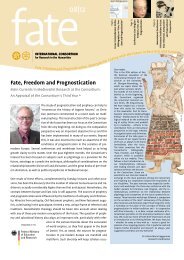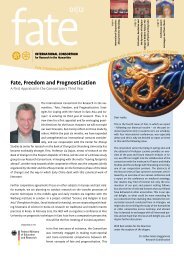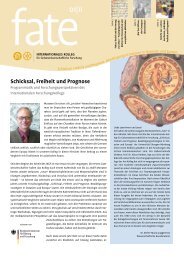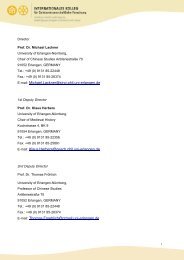Fate, Freedom, and Prognostication - International Consortium for ...
Fate, Freedom, and Prognostication - International Consortium for ...
Fate, Freedom, and Prognostication - International Consortium for ...
Create successful ePaper yourself
Turn your PDF publications into a flip-book with our unique Google optimized e-Paper software.
The ‘renovatio imperii Romanorum’ of Emperor Otto iii <strong>and</strong> the Eschatological<br />
Expectations of His Contemporaries Around the Year 1000<br />
PD Dr. Hannes Möhring (IKGF Visiting Fellow, Universität Bayreuth)<br />
Since the nineteenth century, historians of the European Middle Ages have repeatedly<br />
debated whether many or only a few Christians of western <strong>and</strong> southern Europe<br />
were, in the period shortly be<strong>for</strong>e <strong>and</strong> after the year 1000, strongly influenced <strong>and</strong><br />
frightened by the expectation of the coming of Antichrist <strong>and</strong> his reign of terror – to<br />
be followed by the return <strong>and</strong> triumph of Christ, the end of the world <strong>and</strong> the Last<br />
Judgement. Most historians still doubt, <strong>and</strong> in many cases even deny, any widespread<br />
eschatological excitement at the turn of the millennium 1000/1001.<br />
However, in the widely read Revelations, the only prophecy of the New Testament, St<br />
John tells us that the devil will be imprisoned <strong>for</strong> a thous<strong>and</strong> years <strong>and</strong> then, having<br />
regained his freedom, will terrorise mankind until he is thrown into a lake of burning<br />
sulphur. In a departure from the historical <strong>and</strong> theological mainstream, Johannes<br />
Fried recently has shown that St Augustine, the most influential of the western<br />
Church Fathers, understood the number 1000 literally <strong>and</strong> not symbolically, although<br />
he denied the possibility to determine the date of the coming of Antichrist or the<br />
following return of Christ (<strong>and</strong>, in turn, the end of the world <strong>and</strong> the Last Judgement)<br />
with exactitude.<br />
It is remarkable that, despite the fact that the point relates to a well-established historical<br />
debate, scholars have thus far failed to make any connection between Emperor<br />
Otto III’s announcement of a ‘renovatio imperii Romanorum’, <strong>and</strong> the widespread<br />
Christian belief that the Antichrist would not appear as long as the Roman Empire<br />
existed: the Roman Empire was commonly seen as the last obstacle or katechon restraining<br />
the Antichrist, as described by St Paul (2 Thess. 2:6–7). Thus, it is apparently<br />
no coincidence that the seals of Otto III show the inscription ‘renovatio imperii Ro-<br />
10<br />
Gospel of Emperor Otto iii<br />
Bavarian State Library Munich<br />
manorum’ only in the three years (998, 999 <strong>and</strong> 1000)<br />
immediately be<strong>for</strong>e the turn of the millennium, <strong>and</strong><br />
not in subsequent years. This makes at least one thing<br />
quite clear: Otto III did not believe that the Antichrist<br />
was about to be made manifest, <strong>and</strong> world was nearing<br />
its end. Furthermore, it seems that Otto III deliberately<br />
tried to suppress or at least allay eschatological expectations<br />
(above all the fear of the Antichrist) by propagating<br />
the ‘renovatio imperii Romanorum’ as an antidote.<br />
Perhaps his aim was to prevent mass hysteria <strong>and</strong>/or to<br />
protect his rule against any incalculable disturbances.<br />
Possibly, too, the scarcity of surviving sources about eschatological<br />
expectations in the years around 1000 is,<br />
similarly, not coincidental, but a result of the measures<br />
taken by Otto III <strong>and</strong> his advisers.<br />
None of the previous attempts to explain the intentions<br />
behind the ‘renovatio imperii Romanorum’ is satisfying.<br />
Certainly, it cannot be seen as a political <strong>and</strong>/or religious<br />
programme, because there were no apparent results,<br />
<strong>and</strong> no evidence has survived of relevant actions<br />
or orders. However, no previous attempts at a scholarly<br />
explanation contradict the eschatological interpretation<br />
proposed here.



